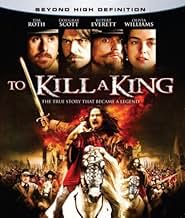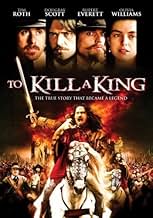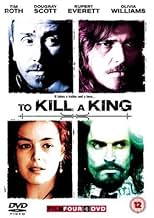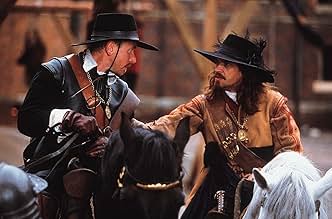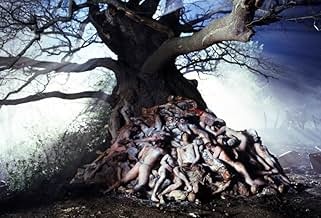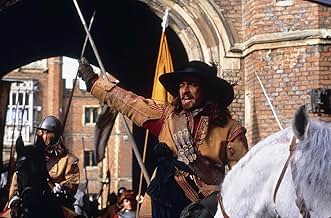ÉVALUATION IMDb
6,2/10
3,5 k
MA NOTE
Ajouter une intrigue dans votre langueA recounting of the relationship between General Fairfax and Oliver Cromwell, as they try to cope with the consequences of deposing King Charles I.A recounting of the relationship between General Fairfax and Oliver Cromwell, as they try to cope with the consequences of deposing King Charles I.A recounting of the relationship between General Fairfax and Oliver Cromwell, as they try to cope with the consequences of deposing King Charles I.
- Nominé pour le prix 1 BAFTA Award
- 3 nominations au total
Histoire
Le saviez-vous
- AnecdotesThe execution of King Charles I was filmed on the exact same day the actual execution took place some 300 years earlier.
- GaffesIn the opening sequence, Fairfax shoots the sword out of the hand of Cromwell's assassin with a flintlock pistol at about 30 yards range. Such pistols had no rifling at that period and were incapable of nowhere near such accuracy, even in the hands of an expert. To shoot at that range Fairfax would have been more likely to have hit the assassin. Also the bullet struck sparks from the sword hilt when it hit. This is impossible as the bullet would have been a soft lead ball and incapable of creating a spark.
- Citations
Denzil Holles: At last we all can sleep soundly, knowing that for once the King cannot impose a new tax on us in the morning.
Sir Thomas Fairfax: You make it sound as if you fought the war only to save your profits, Holles!
Commentaire en vedette
We Americans are pretty bad at knowing our own history let alone that of other countries. As a retired World History teacher, I know that very, very few of us know about the English Civil War of the 17th century. Who fought on each side and what they were fighting over is not something most Americans would know. I know--but considering my job, that's no surprise! So, unless you are really up on English history as well as the lives of Oliver Cromwell and Charles I, you might just want to read up on it before you watch "To Kill a King". Also, you might want to read a few different sources, as most British authors I've read seem to think killing the king was a bad thing--whereas non-Brits probably are more willing to concede that this was pretty cool (particularly American or Marxist historians--who, for once, would agree with each other).
So, I'll give you a bit of background. This story is about the latter portion of the Civil War. Many years have passed and the armies of the Parliament and the King's have fought many battles against each other. Each time the King's forces have been vanquished, he makes promises to make reforms. And, once the armies went home, the King simply ignored these reforms--and the war began anew. The main problem, as I see it, is that the King believed he was an absolute monarch and the Parliament was standing firm on their traditional rights--such as the right to tax (which the King repeatedly ignored). Now, with few remaining friends of his own, the King takes a 'divide and conquer' strategy. In other words, divide the members of Parliament by promising various rewards and bribes. He also escaped custody and threatened to raise yet another army to begin the war again. Now, in light of all this, the leaders of the insurrection now see a need to end it...by killing their king. The army's leader, Fairfax, is reticent--and the man who is one of the powerhouses in Parliament, Cromwell, sees the execution as inevitable. While the film is about this divide and conquer scheme and the eventual trial of the King, it is difficult to understand all that led up to this--a weakness in the film that might have been dealt with by using a prologue or stretching out the film a bit longer.
For history teachers and folks in the know, "To Kill a King" is good stuff--well acted and produced (even if the army of the Parliament only seems to have been made up of about 50 guys in this film!). Otherwise, it does seem to be lacking context which would make it easier to follow--as well as very low energy despite the theme.
So, I'll give you a bit of background. This story is about the latter portion of the Civil War. Many years have passed and the armies of the Parliament and the King's have fought many battles against each other. Each time the King's forces have been vanquished, he makes promises to make reforms. And, once the armies went home, the King simply ignored these reforms--and the war began anew. The main problem, as I see it, is that the King believed he was an absolute monarch and the Parliament was standing firm on their traditional rights--such as the right to tax (which the King repeatedly ignored). Now, with few remaining friends of his own, the King takes a 'divide and conquer' strategy. In other words, divide the members of Parliament by promising various rewards and bribes. He also escaped custody and threatened to raise yet another army to begin the war again. Now, in light of all this, the leaders of the insurrection now see a need to end it...by killing their king. The army's leader, Fairfax, is reticent--and the man who is one of the powerhouses in Parliament, Cromwell, sees the execution as inevitable. While the film is about this divide and conquer scheme and the eventual trial of the King, it is difficult to understand all that led up to this--a weakness in the film that might have been dealt with by using a prologue or stretching out the film a bit longer.
For history teachers and folks in the know, "To Kill a King" is good stuff--well acted and produced (even if the army of the Parliament only seems to have been made up of about 50 guys in this film!). Otherwise, it does seem to be lacking context which would make it easier to follow--as well as very low energy despite the theme.
- planktonrules
- 23 juin 2012
- Lien permanent
Meilleurs choix
Connectez-vous pour évaluer et surveiller les recommandations personnalisées
- How long is To Kill a King?Propulsé par Alexa
Détails
- Date de sortie
- Pays d’origine
- Langue
- Aussi connu sous le nom de
- Cromwell & Fairfax
- Lieux de tournage
- sociétés de production
- Consultez plus de crédits d'entreprise sur IMDbPro
Box-office
- Budget
- 14 300 000 $ US (estimation)
- Brut – à l'échelle mondiale
- 567 471 $ US
- Durée1 heure 42 minutes
- Couleur
- Mixage
- Rapport de forme
- 2.35 : 1
Contribuer à cette page
Suggérer une modification ou ajouter du contenu manquant

Lacune principale
By what name was To Kill a King (2003) officially released in India in English?
Répondre

